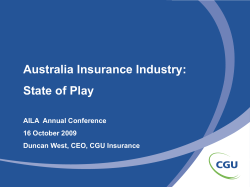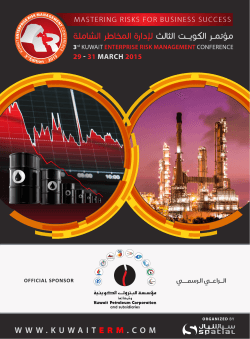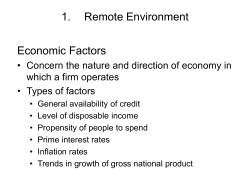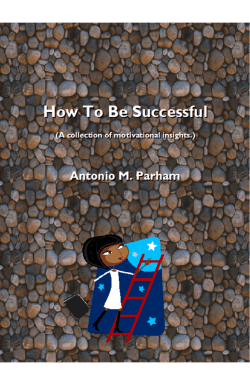
reputation management
INTRODUCTION The term “corporate reputation” refers to how positively, or negatively, a company or similar institution is perceived by its key stakeholders such as employees, customers, members of the media, investors, NGOs, suppliers and financial analysts. The value of a good reputation continues to grow largely because of the competitive advantage and market differentiation it delivers — higher sales generated by satisfied customers and their referrals; relationships with the right strategic and business partners; ability to attract, develop and retain the best talent; benefit of the doubt by stakeholders if crisis strikes; spread of positive word of mouth; potential to raise capital and share price; and in some cases, the option to charge premium prices. Also, in an age of regulatory watch dogs, a positive reputation can improve relationships with government officials and regulators. Financial statements do not accurately reflect the value of a company’s intangible assets such as customer relationships, talent, innovation, patents and reputation. Intangible assets such as reputation are now central to company competitiveness and profitability. Hence, Jubail Reputation Management Conference will be organized during the period 1 – 2 June 2015 as the premier event for Reputation Management in Jubail Industrial City to explore reputation within multidisciplinary framework drawing insights from a number of research fields including communication, public relations, politics, public administration, international relations, business management, human resources, new media, marketing, corporate social responsibility, and sustainability. The conference aims to bring together academic and corporate and government professionals and we hope that it will ignite much needed fresh thinking on reputation management among various disciplines. a CONFERENCE AGENDA DAY 1 | 1 JUNE 2015 18:00 - 19:00 Registration & Networking Reception 19:00 - 19:20 Nicolas Georges Trad Reputation institute Reputation Risk Management, what are the implications and how should business respond? 19:20 - 19:40 Sultan Al-Malik Minister’s Advisor, Dir. Gen. PR &Media Dept. Ministry of Communications & IT, Saudi Arabia PR & Reputation Management 19:40 - 20:00 Abdulmajid Alrashoudi Chief Customer Care Officer Brand Reputation Management 20:00 - 20:20 Amjad Shacker GM Corporate Communication at STC 20:20 - 20:30 Discussion 20:30 - 21:00 Networking Break 21:00 - 21:20 Abdulrahman Al-Abdulqader General Manager of Communication and Media in RCJY and its Spokesman Mental Image and Reputation Management 21:20 - 21:40 Prof. Mohamed Abuamod Hilwan University, Cairo, Egypt Reputation Management in Crisis 21:40 - 22:00 Dr. Reda Abdelwaged Yousef Associate Professor, Dean, College of Arts Online Reputation Management 22:00 - 22:20 Dr. Sameer Mahmood Sultan Qaboos University, Oman Corporate Communications and Reputation Management 22:20 - 22:30 Discussion 22:30 End of day1 & Dinner CONFERENCE AGENDA DAY 2 | 2 JUNE 2015 19:00 - 19:20 Reputation Risk Management Nicolas Georges Trad Reputation institute 22:30 End of day1 & Dinner POST-CONFERENCE WORKSHOP: REPUTATION MANAGEMENT Nicolas Georges Trad Executive Partner, and Executive Member of the Board at Reputation Institute Time : 05:00 PM – 09:00 PM Venue : Sabic Ballroom - Jubail InterContinental Hotel 1- The Reputation management Workshop (2hours) The session will focus on equipping the members with the knowhow and competencies to integrate reputation management in how they should strategically operate and build business plans. • Presentations from Reputation Institute on what reputation is and why it is vital. • The scenario today: current Reputation implications and challenges, trends and opportunities. • Q&A session focused at making the session relevant for participants 2- The Petrochemicals landscape session and roadmap guidelines (3 - 4 hours) We will conduct a “hands on” 3 - 4 hours session to assess the reputation of the industry and design a roadmap to work systematically on reputation. • • • • The reputation of the industry at a global level Reputation risks to be mitigated and opportunities to be communicated: how to ensure pro-active management. Group work to design reputation building programs. How to get advisory support on an ongoing basis.
© Copyright 2025














